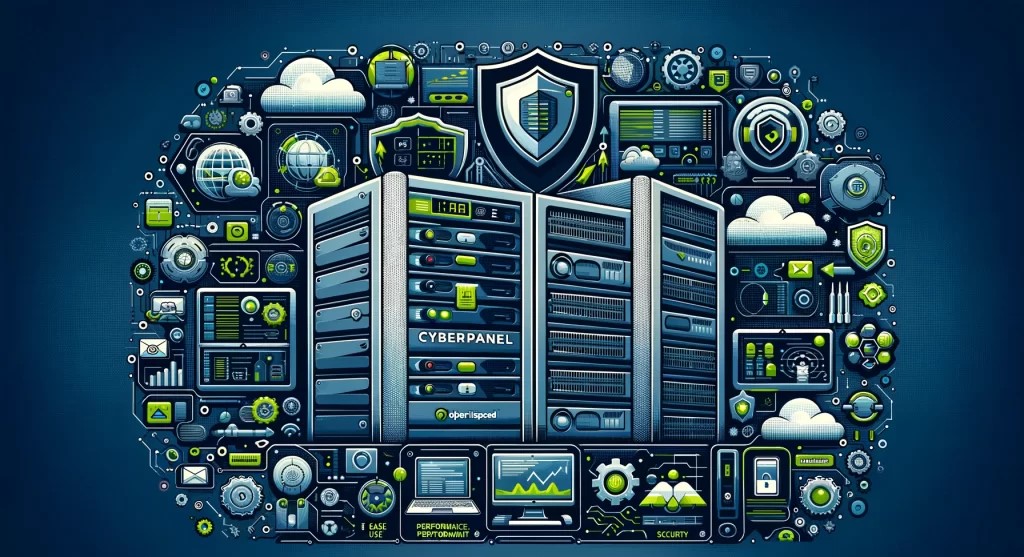Introduction to CyberPanel and its features
What is CyberPanel ?

CyberPanel is a web hosting control panel that is designed to simplify website and server management. It provides a user-friendly interface to manage web hosting services, including domains, databases, email accounts, and more. CyberPanel is built on LiteSpeed Web Server, which is known for its high performance and security. It is an alternative to other control panels like cPanel or Plesk, offering a more affordable, feature-rich option for web hosting.
CyberPanel is suitable for developers, system administrators, and individuals running web hosting businesses. It can be used for a wide range of web hosting scenarios, from personal websites to large-scale enterprises, thanks to its scalability and robust features.
Table of Contents
Key Features of CyberPanel
- LiteSpeed Web Server Integration:
- CyberPanel comes with LiteSpeed Web Server (Enterprise or OpenLiteSpeed), a high-performance web server known for its speed, security, and support for modern web technologies such as HTTP/3 and QUIC. LiteSpeed provides automatic optimization for dynamic content like PHP and static content such as HTML files.
- User-Friendly Interface:
- The control panel is designed with a clean, intuitive user interface that makes it easy to manage servers, websites, and services. Users can quickly navigate through various sections to manage DNS, SSL certificates, and server settings without a steep learning curve.
- One-Click Installations:
- CyberPanel offers a 1-click app installer for popular CMS platforms such as WordPress, Joomla, and more. This feature simplifies the process of deploying applications and reduces the manual configuration required.
- Multi-Server Management:
- With CyberPanel, users can manage multiple servers from a single interface. This is beneficial for hosting companies or users with several virtual private servers (VPS) or dedicated servers.
- Security Features:
- CyberPanel comes with built-in security features like Firewall, SSL certificate management (including automatic SSL installation with Let’s Encrypt), ModSecurity, and protection against DDoS attacks.
- CSF Firewall integration allows users to configure and secure their server network easily.
- Email Management:
- CyberPanel includes a fully functional email system that allows users to create and manage email accounts, set up spam protection, and configure autoresponders. The built-in email services also include webmail for easy access.
- Automatic Backups:
- The control panel supports automated backups for websites, databases, and emails. Users can configure regular backup schedules and store the backups in remote locations like Google Drive, Amazon S3, or FTP servers.
- Database Management:
- CyberPanel supports MySQL and MariaDB for database management. It provides an integrated phpMyAdmin interface for users to manage databases directly from the control panel.
- DNS Management:
- Users can easily manage DNS records such as A records, MX records, and CNAME records directly within CyberPanel, offering control over domain name configurations.
- Container Support (Docker):
- For more advanced users or businesses, CyberPanel supports Docker containers, making it easy to deploy isolated environments for specific applications or services.
- Multi-PHP Version Support:
- CyberPanel supports multiple versions of PHP, allowing users to choose which version is best suited for their applications. This is especially useful for websites and applications that require specific PHP versions.
- Cloud Hosting Support:
- CyberPanel can be used for cloud hosting, including integration with Google Cloud, vpsjungle. This allows for easy deployment and scaling of resources according to demand.
- Custom Branding:
- For web hosting companies, CyberPanel allows for custom branding of the control panel, enabling businesses to offer a personalized user experience to their customers.
- Performance Monitoring:
- CyberPanel includes tools to monitor the performance of your server, websites, and applications, helping users track resource usage and optimize server performance.
- Support for Node.js:
- For developers working with JavaScript-based applications, CyberPanel supports Node.js, allowing them to host Node.js apps seamlessly.
- API Access:
- CyberPanel provides a REST API, which developers can use to automate tasks and integrate the control panel with other systems.
Pros and Cons of CyberPanel

CyberPanel is a powerful, cost-effective web hosting control panel. It offers several advantages, but there are also a few limitations that users should be aware of. Below is an outline of its pros and cons to help you decide if it’s the right choice for your web hosting needs.
Pros of CyberPanel
- Affordable Pricing:
- CyberPanel is free to use, with a premium version offering extra features like LiteSpeed Enterprise. The premium version is still significantly cheaper than competitors like cPanel and Plesk, making it a budget-friendly choice for web hosting businesses and individuals.
- LiteSpeed Web Server:
- CyberPanel integrates with LiteSpeed Web Server (Enterprise or OpenLiteSpeed), known for high performance and security. LiteSpeed optimizes dynamic content like PHP, improves website loading times, and offers built-in support for HTTP/3 and QUIC.
- Ease of Use:
- The user-friendly interface makes CyberPanel easy to navigate, even for beginners. The panel is designed to simplify the management of web hosting tasks like domain management, database handling, email management, and security setup.
- One-Click Application Installation:
- With one-click installers for popular CMS platforms like WordPress, Joomla, and other scripts, CyberPanel makes it easy to set up websites quickly without manual configuration.
- Automatic SSL Certificates:
- CyberPanel offers automatic SSL certificate installation using Let’s Encrypt, ensuring that websites are secure with HTTPS without the need for manual setup or purchasing certificates.
- Multi-PHP Version Support:
- Users can install and use different versions of PHP (from 5.6 to the latest versions), which is essential for running websites or applications that require specific PHP versions.
- Automated Backups:
- CyberPanel includes automated backup features that allow users to schedule regular backups of websites, databases, and emails. Backups can be stored locally or on remote servers like Google Drive and Amazon S3.
- Security Tools:
- CyberPanel offers a range of security features, including built-in firewalls (CSF), ModSecurity for web application protection, and DDoS protection. It also provides CSF firewall integration, which helps protect your server from malicious traffic.
- Container and Docker Support:
- For advanced users and developers, CyberPanel offers Docker container support, enabling the use of containers to run isolated applications. This feature is beneficial for developers working on microservices or multi-stack projects.
- Email Hosting and Management:
- Built-in email services allow you to create email accounts and manage spam protection, email forwarding, and webmail. CyberPanel also supports SMTP/IMAP/POP3 for email services.
- Performance Monitoring:
- CyberPanel has performance monitoring tools to track resource usage (CPU, RAM, Disk I/O) and server health. This helps administrators optimize server performance and troubleshoot issues more effectively.
- Cloud Hosting Integration:
- CyberPanel supports integration with cloud hosting providers like Google Cloud, Vultr, and DigitalOcean, enabling easy deployment and management of cloud servers.
- API for Automation:
- CyberPanel offers a REST API for developers to automate tasks and integrate the control panel with other third-party systems or tools.
- Custom Branding for Resellers:
- Resellers can customize the panel with their logo and branding, offering a white-label solution for web hosting businesses.
Cons of CyberPanel
- Limited Documentation:
- Learning Curve for Advanced Features:
- While the basic features are easy to use, more advanced features (like Docker management, multi-server setups, and security hardening) may have a learning curve for those who are not familiar with Linux server administration.
- Limited Third-Party Integrations:
- Compared to other hosting control panels, CyberPanel has fewer third-party integrations. While it supports Docker and has an API, some integrations that web hosts or developers may need could require custom development.
- Performance on Shared Hosting:
- While LiteSpeed provides high performance, CyberPanel’s free version uses OpenLiteSpeed, which may not deliver the same level of performance as LiteSpeed Enterprise for shared hosting environments. This can be a limitation for users hosting a large number of sites on the same server.
- No Built-in Billing System:
- Unlike other control panels like WHMCS (which integrates with cPanel), CyberPanel does not come with a built-in billing and client management system. Web hosting companies need to use third-party solutions to handle client billing and management.
- Not as Feature-Rich as cPanel/Plesk:
- While CyberPanel offers many useful features, it is still relatively new compared to industry giants like cPanel and Plesk. As a result, it may lack some of the advanced features (like detailed analytics, refined user permissions, or extensive support for third-party apps) that other control panels provide.
- Limited Commercial Support:
- While there is an active community and some paid support options, CyberPanel may not have the same level of commercial support or a large network of professional consultants as other panels like cPanel and Plesk.
- Complex Configuration for Large Setups:
- For users running large-scale hosting environments with many sites and servers, CyberPanel can become complex to manage. Setting up multi-server clusters or large web hosting infrastructures might require additional knowledge and effort.
- Lacks Some Features for Large-Scale Enterprises:
- Some enterprise-level features, such as advanced resource management, load balancing, and multi-cloud setups, are not as polished in CyberPanel as they are in larger control panels, which may limit its use in high-demand, enterprise-level hosting environments.
Conclusion
CyberPanel is a powerful, cost-effective web hosting control panel with many advanced features like LiteSpeed integration, automatic SSL certificates, and Docker support, making it ideal for developers, small businesses, and resellers. However, its documentation, learning curve, and lack of some enterprise-level features may pose challenges for large-scale setups or those accustomed to more established control panels like cPanel or Plesk.
Ultimately, the decision to use CyberPanel should depend on your specific needs, technical skill level, and the size of your hosting environment. For small to medium-sized projects or users seeking a budget-friendly alternative, CyberPanel offers excellent value.
